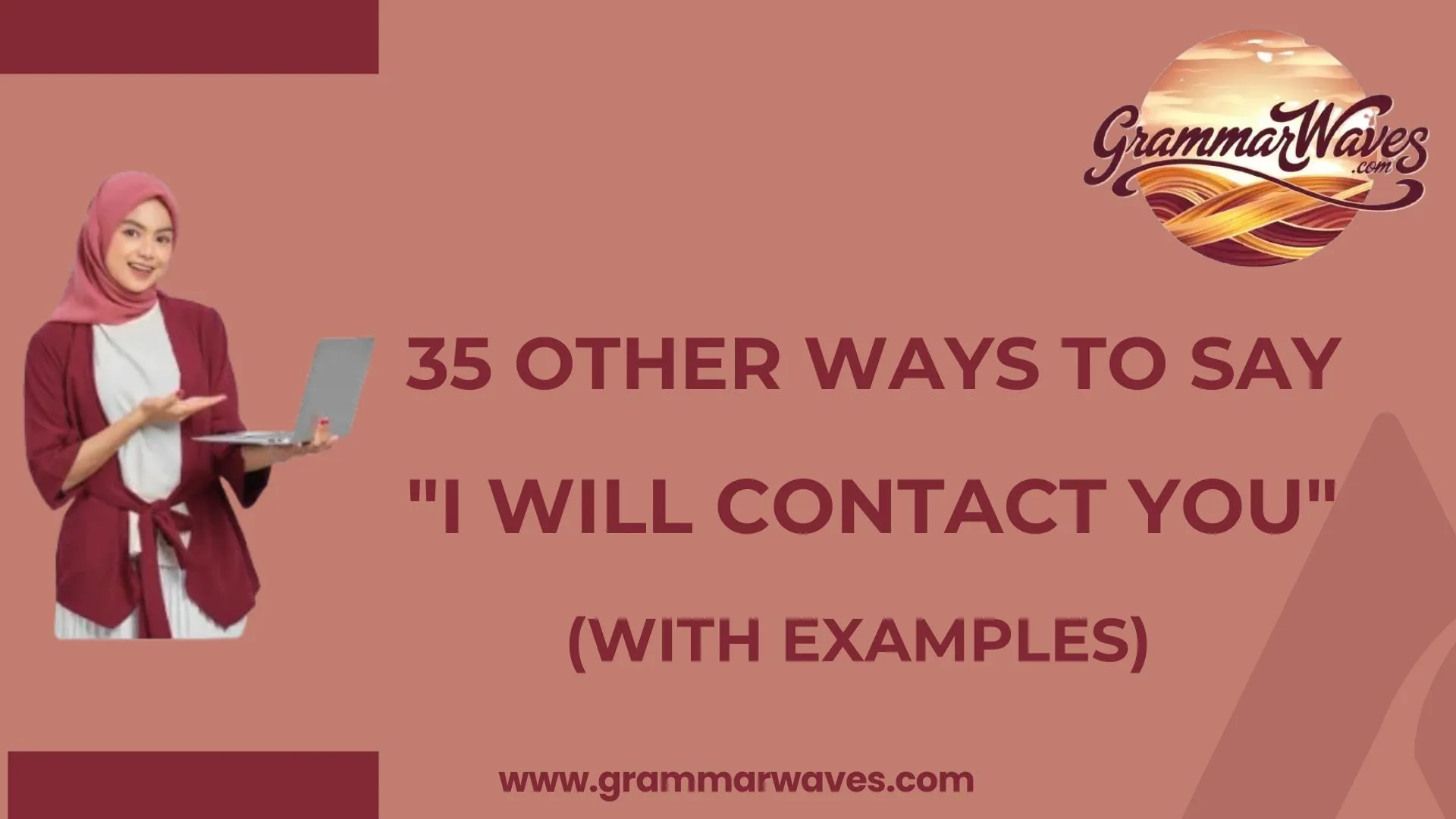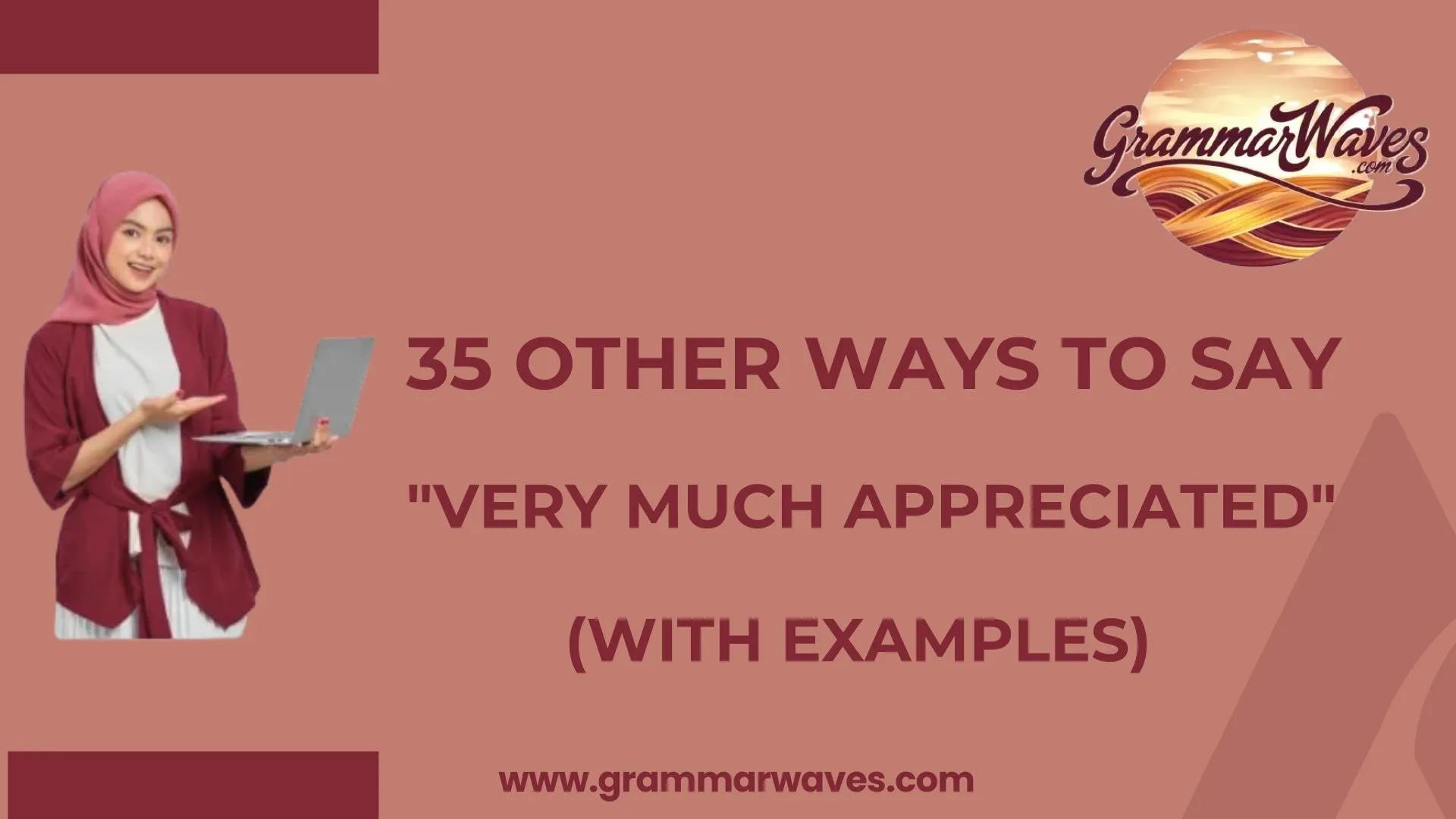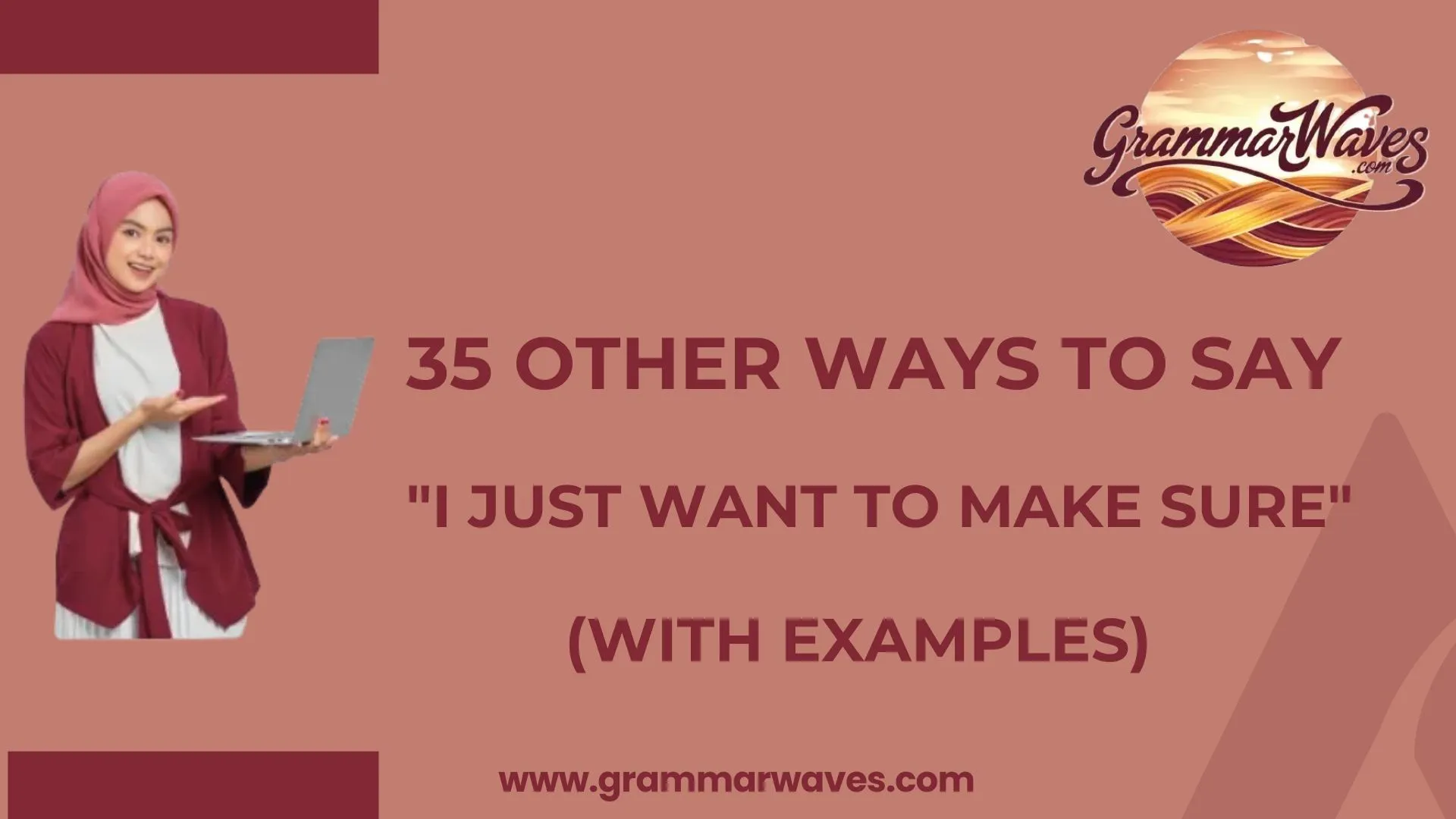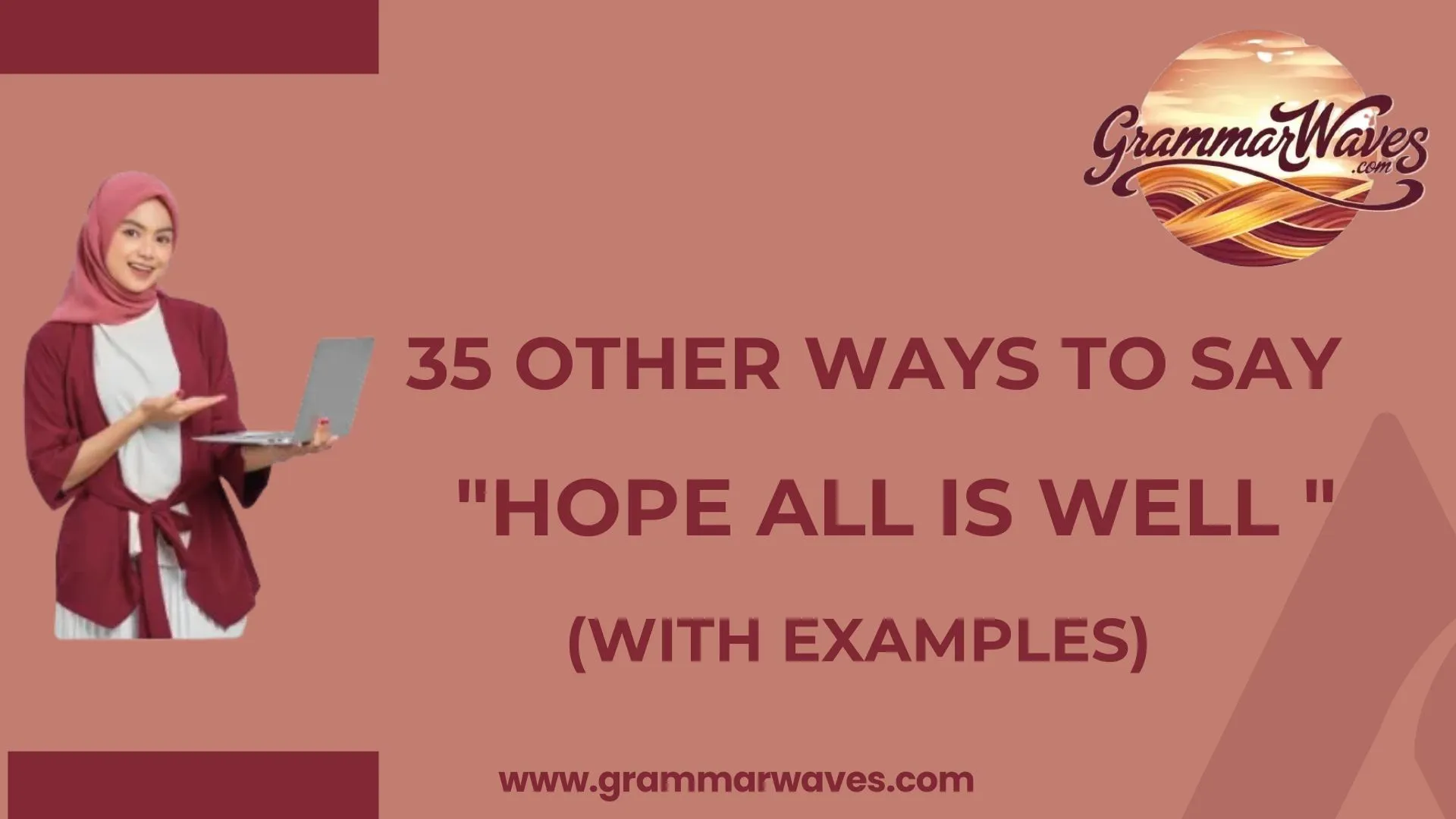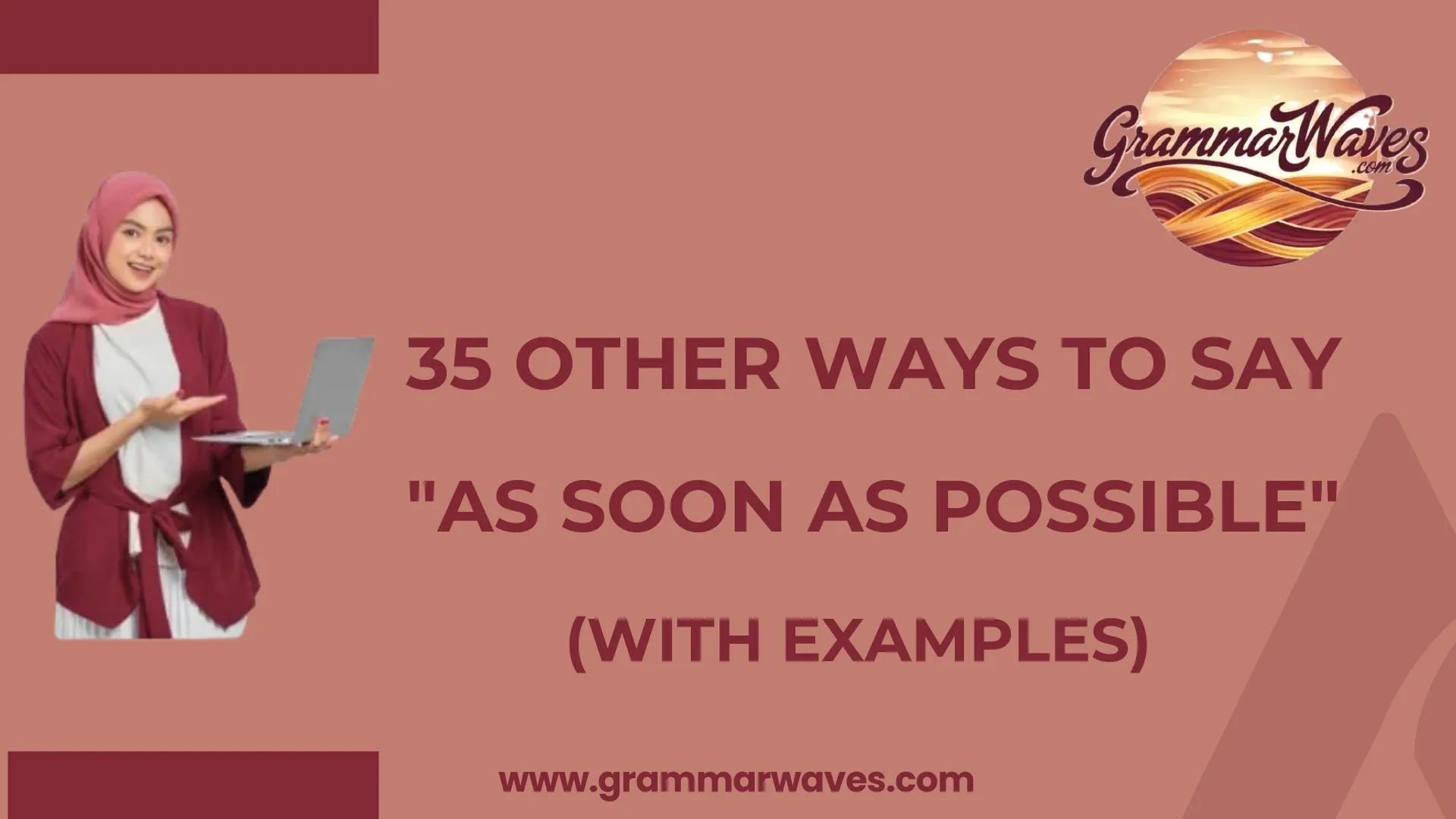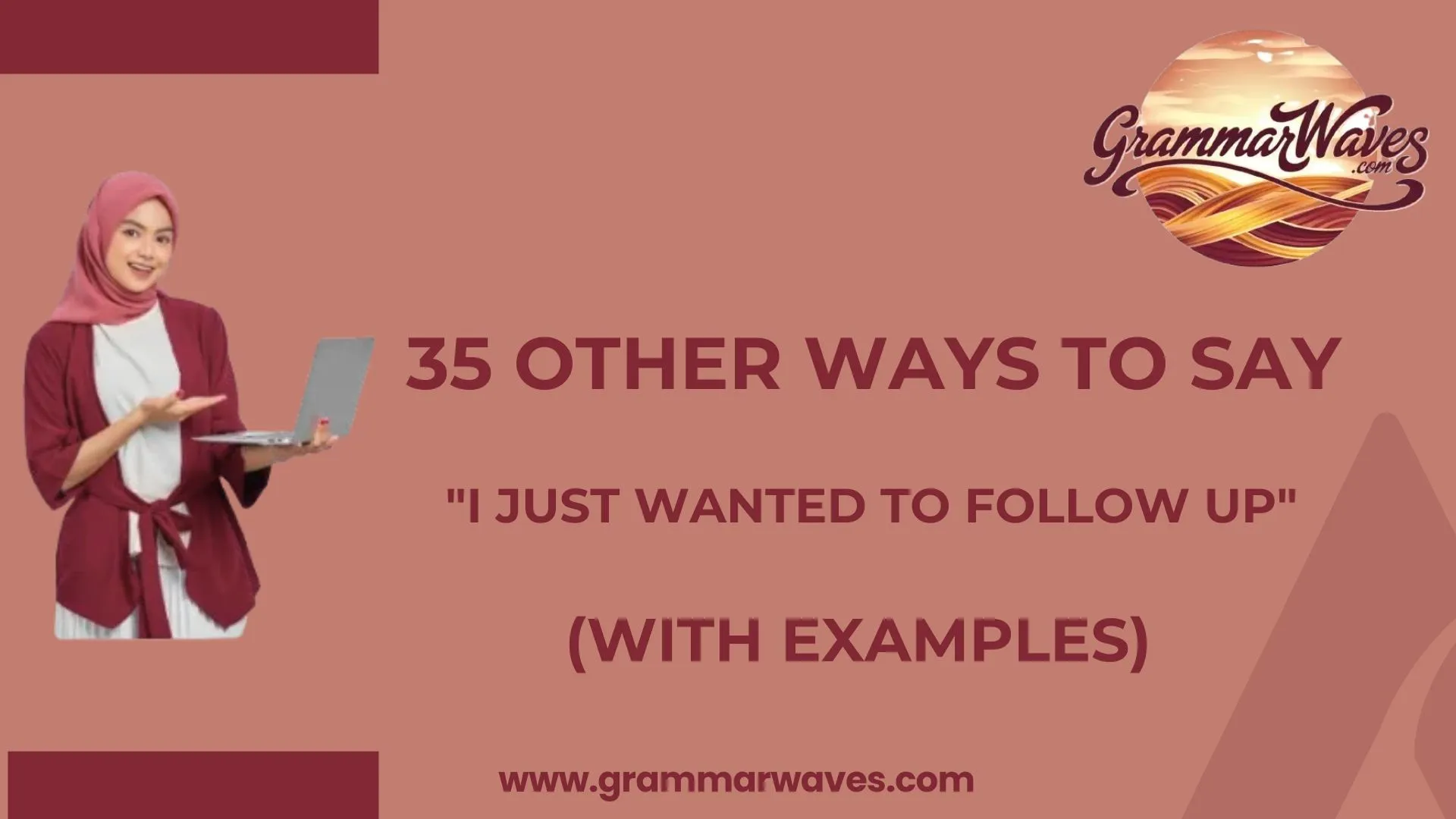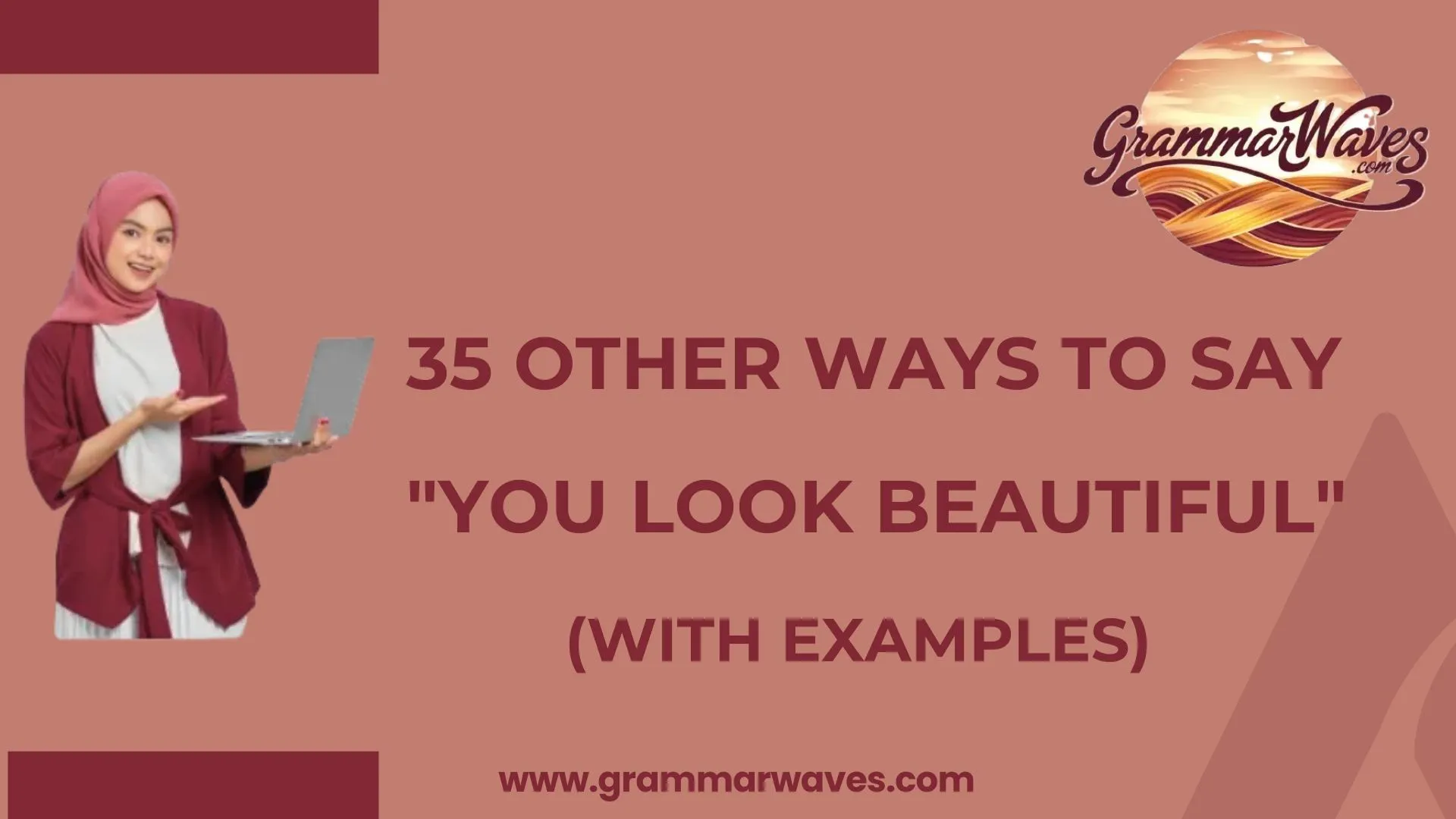When communicating, effectively exchanging words means more than these 35 other ways to say “I Will Contact You”; it’s about showing care, respect, and consideration in your message so that it resonates with the recipient. Choosing the right phrasing can make even a simple note feel personal, warm, and professional. From experience, thoughtfully exploring 35 alternatives can help express intention clearly while leaving a stronger impression, ensuring communication feels genuine and intentional.
I often focus on choosing words that help convey intention thoughtfully, making the recipient feel acknowledged and respected. Small adjustments in phrasing can make a message feel more personal and warm, rather than routine. By showing care and consideration when exchanging words, you build trust, professionalism, and clarity. This guide is meant to explore alternatives that go beyond standard replies, offering 35 ways to communicate effectively while maintaining a meaningful connection.
What Does “I Will Contact You” Mean?
“I Will Contact You” is a phrase used to express the intent of reaching out or communicating with someone at a later time. It signals that the conversation is not over, and the sender is committed to following up. To promise or indicate that you will initiate communication in the future.“Thank you for your inquiry; I Will Contact You once I have all the details.”Professional emails, polite follow-ups, and casual conversations where reassurance is needed.Informal texting with friends, where a casual tone is better.Courteous, responsible, and proactive.
When to Use “I Will Contact You”
You can use this phrase in a variety of situations:
- Professional settings: Following up with clients or colleagues.
- Customer service: Confirming that support will reach out.
- Networking: After meeting someone, signaling future communication.
- Personal communication: Reassuring friends or family, you’ll follow up on plans.
It’s best used when you want to show reliability and consideration.
Is It Professional/Polite to Say “I Will Contact You”?
Absolutely. This phrase is both professional and polite. It conveys:
- Accountability and responsibility.
- Respect for the recipient’s time.
- Clear intention without being pushy or vague.
Pros or Cons of Saying “I Will Contact You”
Pros:
- Simple and clear.
- Universally understood.
- Shows initiative and reliability.
Cons:
- It can feel generic if overused.
- Lacks warmth if the tone is flat.
- Might need more context for urgency or time frame.
I Will Contact You Synonyms:
- I’ll Reach Out to You
- I’ll Get in Touch
- I’ll Follow Up
- I’ll Be in Contact
- I’ll Give You a Call
- I’ll Drop You a Line
- I’ll Keep You Updated
- I’ll Touch Base With You
- I’ll Keep in Touch
- I’ll Send You an Update
- I’ll Reach Out Soon
- I’ll Get Back to You
- I’ll Ping You
- I’ll Send You a Message
- I’ll Reach Out When Ready
- I’ll Give You a Heads-Up
- I’ll Keep You Posted
- I’ll Connect With You
- I’ll Call You Back
- I’ll Touch Base Soon
- I’ll Follow Through
- I’ll Reach Out Shortly
- I’ll Communicate With You
- I’ll Reach Out Personally
- I’ll Update You
- I’ll Circle Back
- I’ll Touch Base With You Soon
- I’ll Follow Up With You
- I’ll Reach Out As Soon As Possible
- I’ll Notify You
- I’ll Check In With You
- I’ll Respond Soon
- I’ll Keep in Communication
- I’ll Touch Base Later
- I’ll Get in Touch With You Soon
I’ll Reach Out to You
Meaning:
Informing someone that you will initiate contact.
Definition:
A friendly, approachable way to communicate intention.
Explanation:
Often used in professional and casual contexts, conveys effort and availability.
Example:
“Once the documents are ready, I’ll reach out to you to discuss next steps.”
Best Use:
Networking, team communication, and follow-ups.
Worst Use:
Highly formal legal or contractual situations.
Tone:
Friendly, approachable, proactive.
I’ll Get in Touch
Meaning:
A casual way of saying you will make contact.
Definition:
Signifies intention to communicate soon.
Explanation:
Can be informal or semi-formal, depending on context.
Example:
Thanks for your interest! I’ll get in touch once I have the updates.”
Best Use:
Professional but relaxed emails, peer communication.
Worst Use:
Formal legal correspondence.
Tone:
Casual, warm, confident.
I’ll Follow Up
Meaning:
Ensures continuation of a discussion or task.
Definition:
Indicates proactive effort to provide additional information.
Explanation:
Common in business emails; shows responsibility and attentiveness.
Example:
“I’ll follow up with you next week regarding the project status.”
Best Use:
Workplace communication, project management, and client updates.
Worst Use:
Informal texting with friends-it may sound overly businesslike.
Tone:
Professional, reliable, proactive.
I’ll Be in Contact
Meaning:
Simple declaration of intent to communicate.
Definition:
Neutral, clear, and professional phrasing.
Explanation:
A safe choice for email, phone, or messaging.
Example:
“I’ll be in contact once I gather the necessary information.”
Best Use:
Formal and semi-formal correspondence.
Worst Use:
Casual or intimate conversations might feel stiff.
Tone:
Professional, courteous, direct.
I’ll Give You a Call
Meaning:
Promise of telephonic communication.
Definition:
Indicates follow-up via phone, often with urgency or personal touch.
Explanation:
Suggests a more personal engagement than email.
Example:
“I’ll give you a call tomorrow to discuss the details.”
Best Use:
Friendly, personal, or urgent professional contexts.
Worst Use:
When the person prefers written communication only.
Tone:
Personal, attentive, engaging.
I’ll Drop You a Line
Meaning:
An informal way to promise communication, typically via email or message.
Definition:
Lighthearted, friendly follow-up.
Explanation:
Often used in personal or semi-professional interactions.
Example:
“After the conference, I’ll drop you a line to share my notes.”
Best Use:
Casual networking or friendly follow-up.
Worst Use:
Highly formal business emails.
Tone:
Friendly, approachable, informal.
I’ll Keep You Updated
Meaning:
Commitment to provide ongoing information.
Definition:
Shows responsibility and continuous engagement.
Explanation:
Often used in projects or situations with evolving information.
Example:
“I’ll keep you updated on the shipment progress.”
Best Use:
Professional project updates, client communication.
Worst Use:
Casual social chats-it may sound too formal.
Tone:
Informative, reliable, proactive.
I’ll Touch Base With You
Meaning:
Informal, business-friendly way to reconnect.
Definition:
Signifies a check-in or brief update.
Explanation:
Frequently used in workplace communication for short follow-ups.
Example:
“Let’s touch base next week about the new campaign.”
Best Use:
Team or client interactions, informal business communication.
Worst Use:
Overly formal letters or sensitive communications.
Tone:
Professional yet relaxed.
I’ll Keep in Touch
Meaning:
Assurance of ongoing communication over time.
Definition:
Typically used in professional or social contexts for long-term engagement.
Explanation:
Conveys thoughtfulness and relationship building.
Example:
“I’ll keep in touch as your project progresses.”
Best Use:
Networking, mentoring, and long-term project collaboration.
Worst Use:
Immediate or urgent communication-it may imply delay.
Tone:
Friendly, considerate, ongoing.
I’ll Send You an Update
Meaning:
Commitment to provide information soon.
Definition:
Professional phrasing indicates structured communication.
Explanation:
Often email-based; good for transparency.
Example:
“I’ll send you an update once the report is finalized.”
Best Use:
Workplace communication, client updates.
Worst Use:
Casual chats-it can sound too formal.
Tone:
Informative, precise, professional.
I’ll Reach Out Soon
Meaning:
Promises timely communication.
Definition:
Suggests prompt follow-up without being overly specific.
Explanation:
Often used when you want to assure someone you won’t delay reaching out.
Example:
“I’ll reach out soon once I have the finalized schedule.”
Best Use:
Professional emails, courteous follow-ups.
Worst Use:
Informal chats where exact timing is expected.
Tone:
Friendly, proactive, reassuring.
I’ll Get Back to You
Meaning:
Promise to respond after some time.
Definition:
Common in business and casual communication, indicating a follow-up after gathering information.
Explanation:
Flexible and widely understood; can be informal or professional.
Example:
“Thanks for your question; I’ll get back to you with more details.”
Best Use:
Client communication, internal emails.
Worst Use:
Overused in formal commitments without a timeframe.
Tone:
Neutral, responsible, polite.
I’ll Ping You
Meaning:
Informal promise to contact digitally.
Definition:
Modern, casual phrasing is typically for emails, messaging apps, or work chats.
Explanation:
Good for quick check-ins, especially in tech or creative workplaces.
Example:
“I’ll ping you when the design files are ready.”
Best Use:
Internal team chats, casual professional communication.
Worst Use:
Formal or external client emails.
Tone:
Casual, modern, friendly.
I’ll Send You a Message
Meaning:
Promise of written communication.
Definition:
Clear and direct; specifies that the contact will be through text, email, or messaging app.
Explanation:
Good for personal and professional use, conveys clarity and effort.
Example:
“I’ll send you a message with the meeting link.”
Best Use:
Semi-formal and casual contexts.
Worst Use:
Formal legal or high-stakes business correspondence.
Tone:
Clear, polite, approachable.
I’ll Reach Out When Ready
Meaning:
Communication will occur once preparations are complete.
Definition:
Signals’ timing will depend on readiness, showing thoughtfulness.
Explanation:
Useful when tasks or information need completion before contact.
Example:
“I’ll reach out when the report is ready for review.”
Best Use:
Project updates, task follow-ups.
Worst Use:
Urgent matters where delay is critical.
Tone:
Considerate, responsible, professional.
I’ll Give You a Heads-Up
Meaning:
Promise to inform ahead of time.
Definition:
Indicates proactive communication before a particular event or update.
Explanation:
Often informal, friendly, and reassuring.
Example:
“I’ll give you a heads-up before the team meeting starts.”
Best Use:
Friendly professional settings or casual notifications.
Worst Use:
Formal legal or contractual communication.
Tone:
Informal, friendly, considerate.
I’ll Keep You Posted
Meaning:
Commitment to ongoing updates.
Definition:
Friendly and informal version of “I’ll keep you updated.”
Explanation:
Suggests continuous involvement and attentiveness.
Example:
“I’ll keep you posted on any changes to the schedule.”
Best Use:
Casual professional updates, team communication.
Worst Use:
Very formal client communication; may feel too casual.
Tone:
Approachable, engaged, considerate.
I’ll Connect With You
Meaning:
Promise to initiate a conversation or interaction.
Definition:
Professional and versatile, suitable for in-person, phone, or digital contact.
Explanation:
Conveys approachability and willingness to communicate.
Example:
“I’ll connect with you to go over the project details.”
Best Use:
Networking, professional meetings, follow-ups.
Worst Use:
Overly casual contexts where simplicity is better.
Tone:
Professional, courteous, warm.
I’ll Call You Back
Meaning:
Promise to return a phone call.
Definition:
Clear and direct, ideal for telephonic communication.
Explanation:
Conveys attentiveness and respect for the other person’s time.
Example:
I’m tied up at the moment, but I’ll call you back shortly.”
Best Use:
Personal and professional phone interactions.
Worst Use:
Text or email-only contexts.
Tone:
Polite, responsive, responsible.
I’ll Touch Base Soon
Meaning:
Promise to check in shortly.
Definition:
Casual, professional phrasing for brief updates.
Explanation:
Conveys intention to maintain communication without imposing.
Example:
“I’ll touch base soon to discuss next steps.”
Best Use:
Team collaboration, informal business communication.
Worst Use:
Formal correspondence; may feel too relaxed.
Tone:
Friendly, professional, approachable.
I’ll Follow Through
Meaning:
Assurance of completing communication or a task.
Definition:
Indicates commitment and responsibility.
Explanation:
Shows reliability and professionalism.
Example:
“I’ll follow through and send you the finalized report.”
Best Use:
Professional and project-related communications.
Worst Use:
Casual chats may sound too serious.
Tone:
Responsible, professional, dependable.
I’ll Reach Out Shortly
Meaning:
Indicates prompt contact.
Definition:
Emphasizes urgency without being abrupt.
Explanation:
Signals attentiveness and respect for time.
Example:
“I’ll reach out shortly with the updated proposal.”
Best Use:
Professional emails, customer service.
Worst Use:
Casual or long-term projects where timing isn’t immediate.
Tone:
Polite, prompt, professional.
I’ll Communicate With You
Meaning:
Broad promise of communication.
Definition:
Neutral and formal, suitable for multiple formats.
Explanation:
Clear, professional, and universally understood.
Example:
“I’ll communicate with you regarding any changes in the schedule.”
Best Use:
Formal correspondence, official updates.
Worst Use:
Informal chats may sound stiff.
Tone:
Professional, neutral, respectful.
I’ll Reach Out Personally
Meaning:
Promise of individual attention.
Definition:
Highlights effort and personal engagement.
Explanation:
Conveys warmth and care.
Example:
“I’ll reach out personally to address your concerns.”
Best Use:
Customer service, personalized professional communication.
Worst Use:
Mass or automated emails; tone may feel misleading.
Tone:
Warm, caring, attentive.
I’ll Update You
Meaning:
Promise to provide information.
Definition:
Concise, professional phrasing for follow-ups.
Explanation:
Indicates responsibility and timeliness.
Example:
“I’ll update you once the team completes the review.”
Best Use:
Workplace and project communication.
Worst Use:
Casual or personal chats may feel formal.
Tone:
Professional, clear, proactive.
I’ll Circle Back
Meaning:
Return to a topic or conversation later.
Definition:
Informal-professional phrasing is commonly used in meetings.
Explanation:
Suggests intention to continue dialogue.
Example:
“I’ll circle back after I gather the necessary information.”
Best Use:
Workplace, meetings, internal communication.
Worst Use:
Formal written contracts or external client letters.
Tone:
Casual, professional, approachable.
I’ll Touch Base With You Soon
Meaning:
Short-term follow-up promise.
Definition:
Combines casual and professional tones; emphasizes promptness.
Explanation:
Useful for project updates or collaborative discussions.
Example:
“I’ll touch base with you soon to finalize details.”
Best Use:
Workplace updates, team communication.
Worst Use:
Highly formal business communication.
Tone:
Friendly, professional, prompt.
I’ll Follow Up With You
Meaning:
Ensures a continuation of communication.
Definition:
Formal and reliable; widely used in professional settings.
Explanation:
Indicates accountability and proactive engagement.
Example:
“I’ll follow up with you next week after the review meeting.”
Best Use:
Client communications, project management.
Worst Use:
Informal texting may feel stiff.
Tone:
Professional, dependable, responsible.
I’ll Reach Out As Soon As Possible
Meaning:
Promise for urgent or prioritized communication.
Definition:
Emphasizes quick response while showing consideration.
Explanation:
Conveys urgency and attentiveness without being pushy.
Example:
“I’ll reach out as soon as possible with the necessary documents.”
Best Use:
Customer support, urgent project matters.
Worst Use:
Casual, non-urgent situations may seem anxious.
Tone:
Responsible, prompt, polite.
I’ll Notify You
Meaning:
Promise to provide official information.
Definition:
Formal, professional phrasing is often used in announcements.
Explanation:
Suggests official updates or important messages.
Example:
“I’ll notify you once the application has been approved.”
Best Use:
Professional, official, or legal communication.
Worst Use:
Casual social chats.
Tone:
Formal, professional, clear.
I’ll Check In With You
Meaning:
Friendly follow-up for updates or reassurance.
Definition:
Combines warmth with professionalism.
Explanation:
Useful for ongoing projects or personal conversations.
Example:
“I’ll check in with you next week to see how things are progressing.”
Best Use:
Professional or personal project follow-ups.
Worst Use:
Urgent communications may imply delay.
Tone:
Friendly, considerate, professional.
I’ll Respond Soon
Meaning:
Promise to reply promptly.
Definition:
Simple and versatile; indicates timeliness.
Explanation:
Works well for emails, messages, or requests.
Example:
“I’ll respond soon with the necessary details.”
Best Use:
Professional and casual contexts.
Worst Use:
When specific timing is required, it may feel vague.
Tone:
Neutral, polite, timely.
I’ll Keep in Communication
Meaning:
Ongoing engagement over time.
Definition:
Formal version of “keep in touch.”
Explanation:
Often used for long-term projects or professional collaborations.
Example:
“I’ll keep in communication regarding any updates to the project.”
Best Use:
Formal projects, professional networking.
Worst Use:
Casual or short-term interactions.
Tone:
Professional, dependable, considerate.
I’ll Touch Base Later
Meaning:
Promise to reconnect at a later time.
Definition:
Informal yet professional, it indicates short-term follow-up.
Explanation:
Good for conversations needing additional discussion.
Example:
“I’ll touch base later after reviewing the files.”
Best Use:
Team discussions, project follow-ups.
Worst Use:
Urgent matters may seem delayed.
Tone:
Casual, professional, approachable.
I’ll Get in Touch With You Soon
Meaning:
Friendly promise of near-future communication.
Definition:
Flexible phrasing suitable for professional and personal contexts.
Explanation:
Conveys attentiveness and commitment.
Example:
“I’ll get in touch with you soon to finalize the arrangements.”
Best Use:
Professional follow-ups, casual engagements.
Worst Use:
Overly formal letters require specific timeframes.
Tone:
Warm, polite, approachable.
Final Thoughts
Choosing the right way to say “I Will Contact You” is more than just selecting words-it’s about conveying care, professionalism, and thoughtfulness. Every interaction is an opportunity to build trust, strengthen relationships, and make the recipient feel valued. By using alternatives like “I’ll follow up,” “I’ll reach out personally,” or “I’ll keep you updated,” you can tailor your tone to fit any context-whether it’s professional, casual, urgent, or friendly.
The beauty of these alternatives lies in their subtle nuances. Some express immediacy, like “I’ll reach out shortly”, while others highlight ongoing communication, such as “I’ll keep in touch”. Choosing the right phrasing ensures that your message feels warm, clear, and intentional. Over time, mastering these expressions can elevate your communication style, making you appear thoughtful, reliable, and approachable.
Remember, context matters. A phrase that works perfectly in a casual email may not suit a formal client update. Likewise, adding a timeframe or specifying the method of communication phone or email-can further enhance clarity and professionalism.
Ultimately, these 35 alternatives provide you with a versatile toolkit for expressing the simple yet powerful promise of staying in touch. Thoughtful phrasing isn’t just about words; it’s about showing respect, attentiveness, and consideration. By consciously choosing how you communicate, you demonstrate authenticity, reliability, and warmth, turning routine follow-ups into meaningful connections.
FAQs
What is the most professional way to say “I Will Contact You”?
For professional contexts, “I’ll follow up” or “I’ll keep you updated” are ideal. These phrases convey responsibility, reliability, and clear intent without sounding too casual or vague, making them perfect for emails, client communications, and workplace follow-ups.
How can I make my follow-up sound more personal?
Adding warmth to your message helps. Use phrases like “I’ll reach out personally” or “I’ll give you a call”. Mentioning specific details or context, like the topic or timing, makes your follow-up feel considerate and thoughtful, ensuring the recipient feels valued.
Which alternatives work best for casual communication?
Friendly phrases such as “I’ll drop you a line,” “I’ll ping you,” or “I’ll touch base” work well. They convey approachability and warmth while keeping the tone relaxed, making them suitable for coworkers, peers, or informal networking situations.
Is it necessary to include a timeframe when saying “I Will Contact You”?
Yes. Adding a timeframe, like “I’ll reach out by Friday,” shows professionalism and respect for the recipient’s time. It sets clear expectations, avoids misunderstandings, and communicates reliability, which is especially important in work or client-related contexts.
Can these alternatives be used across email, phone, and messaging?
Absolutely. Most alternatives are versatile. Phrases like “I’ll get in touch soon” or “I’ll follow up” can be adapted to emails, phone calls, and instant messages. Adjust the tone to match the platform, audience, and level of formality for maximum effectiveness.

Hi, I’m Olivia Sinclair, the voice behind GrammarWaves.com. I’ve spent years studying the fine points of English grammar, usage, and style – and I created this site to make those tricky topics feel simple, clear, and even enjoyable.
